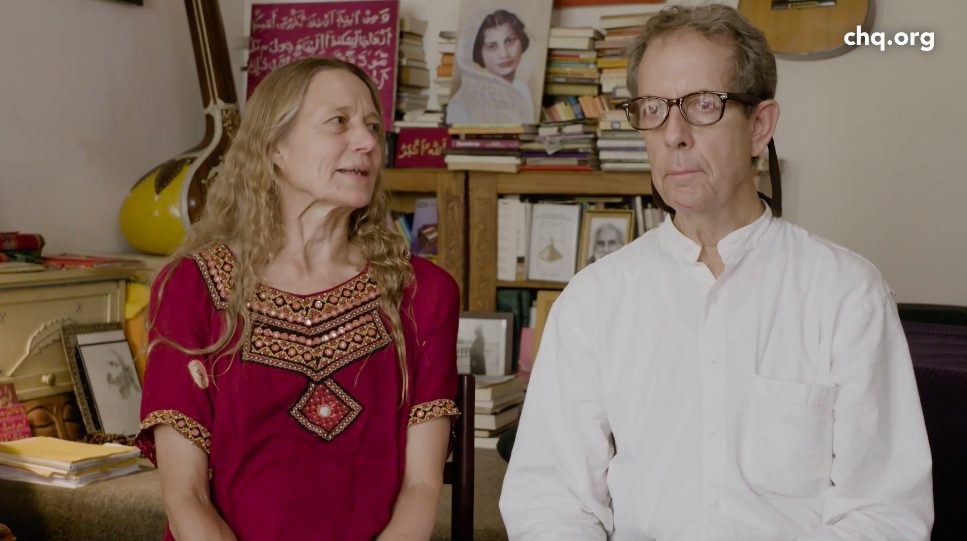
In Sufism, life began when Allah gave a deep sigh of compassion and poured heavenly qualities into Earth.
“It’s said that the divine was pregnant with this longing to know itself and to give forth something,” said Kainat Felicia Norton.
Norton and Muinuddin Charles Smith described the creation story of Sufism on Week Seven’s Interfaith Friday. Pre-recorded in their New York apartment, the lecture was released at 2 p.m. EDT Aug. 14, on the CHQ Video Assembly Platform.
Norton and Smith lead the Inayati Sufi Order as senior Sufi teachers, retreat guides and interfaith ministers. They founded the Light of Guidance Center for Sufi Studies in New York City.
Smith said creation was instantaneous when God said the words, “Be and so become.” God’s angels, which existed previously (though not in cherub form), did not understand God’s creation — especially humans, who were tasked as “vice regents” of God.
The angels were most concerned with humans’ potential for mischief. The first Qur’an stories detail how humans go astray, which include the story of stringing up a she-camel.
“There is so much of the Qur’an warning people that we have a tendency to get out of harmony,” Smith said. “The warnings can sound pretty severe. … But there’s also a part of the Qur’an where Allah says, ‘My mercy precedeth my wrath.’ The wrath is if we don’t live in harmony with life and we’re gonna make a mess.”
But humans also have an ability to act upright and grow into their responsibility to help God deliver the divine on earth. Humans are described as fragments of light or of the divine being, with a body of clay and a crown of stars.
“It’s not possible for the creator to be separate from creation,” Smith said. “It’s like the carpenter has become the wood. … There’s an understanding that divine self-knowledge is a revelation of the spark that’s in each of us. It doesn’t have to take a spiritual or religious form, but it’s something about being enthusiastic, having ‘theos’ within us.”
Sufis either choose new first names — or in Norton and Smith’s cases, Sufi teachers give them new first names — to serve as a reminder of a goal or value to strive for. It’s related to aspiring to that responsibility to bring the divine onto Earth.
“Usually, you’re given a name because you’re meant to unfold that or grow into it, or it’s like an affirmation,” Norton said.
Smith’s, Muinuddin, was given to him two years after he joined a Sufi community. When asked to find a quote by a Sufi prophet or leader, he was struggling to find one that resonated with him. He was sitting in front of a fireplace when a piece of paper fell out of the fireplace into his hand.
“It was the last words of an ancient Sufi,” Smith said. “Long quote, but it said, ‘Love all, hate none. Mere talk of God will not get you far. Mere talk of religion will not get you far. Bring out all the potential of your being and serve the people, and serve the poor and the widow.’”
The next day, Smith’s guide called him and said he had picked out a name for him: Muinuddin. It was the name of the same saint, Khwaja Muinuddin Chishti, from the fireplace quote.
Norton had the first name Sharifa for years. In 2015, while teaching in a program, another teacher said, “I have a new name for you.” It was Kainat, a Persian name which means “the universe.”
With every breath of God, there is a new possibility,” Norton said.
There is a repeated theme in Sufism of bringing the divine on Earth, rather than accessing the divine through a transcendent experience. Norton said for a full life, the flame in the heart of a human must align with the light from above.
“It’s said that the human is higher than the angel, because it’s more difficult here,” Norton said. “It’s a little harder here than to be up there as an angel. And yet, it has more value because the human has a full experience. Through manifestation, a lot more has happened than just staying in the angelic light.”
Another practice in Sufism and Islam, though Smith said this is also found in Judaism, Hinduism and Tibetan Buddhism, is to repeat the name of Allah, or another name for the divine, through chanting and praying for Allah to remember a person. It invokes, “Remember Allah, and Allah will remember you,” from the Qur’an.
“We generate the light of the soul through the word we repeat,” Smith said. “That’s a very important practice for seeing clearly what this world is about, and living in a way that is in harmony with light, with nature, with all of life.”
Norton also said that creation isn’t done unfolding.
“With every breath of God, there is a new possibility,” Norton said.




